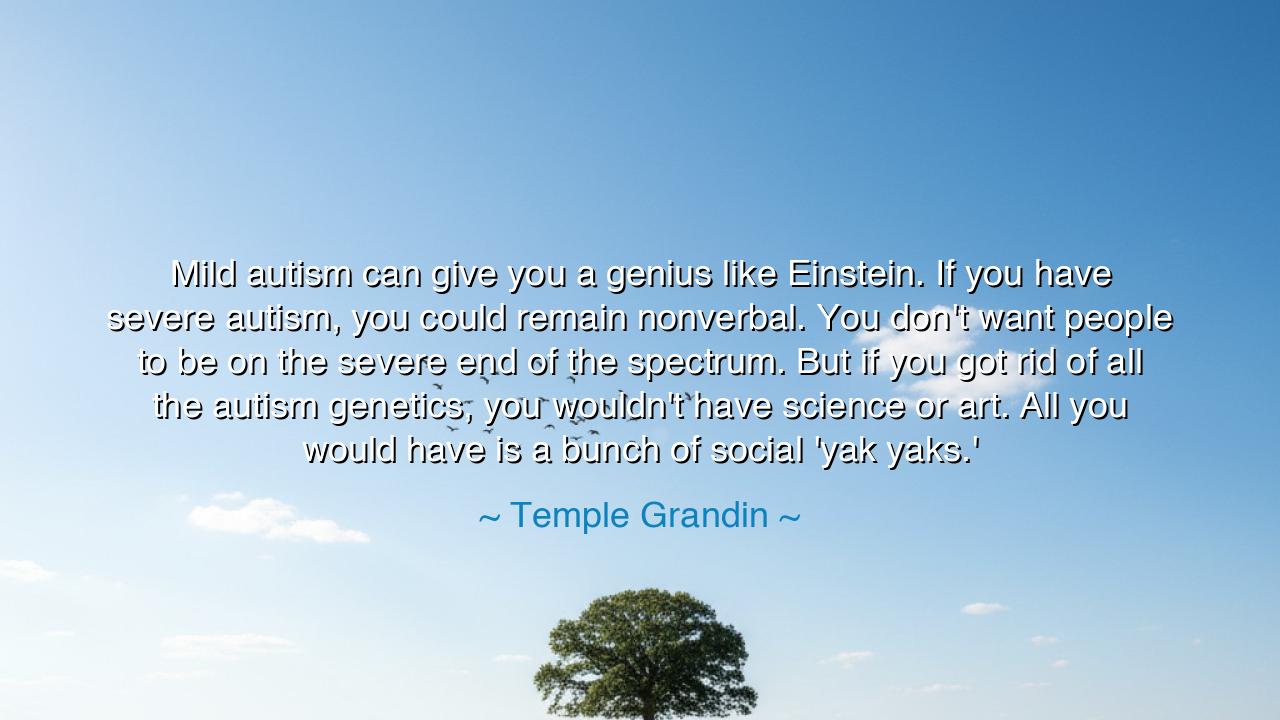
Mild autism can give you a genius like Einstein. If you have
Mild autism can give you a genius like Einstein. If you have severe autism, you could remain nonverbal. You don't want people to be on the severe end of the spectrum. But if you got rid of all the autism genetics, you wouldn't have science or art. All you would have is a bunch of social 'yak yaks.'






Hear, O Seekers of Understanding, the words of Temple Grandin, a woman whose wisdom and insight into the nature of autism remind us of the deep interplay between mind and society. "Mild autism can give you a genius like Einstein. If you have severe autism, you could remain nonverbal. You don't want people to be on the severe end of the spectrum. But if you got rid of all the autism genetics, you wouldn't have science or art. All you would have is a bunch of social 'yak yaks.'" In these words, Grandin offers a profound reflection on the complexity of human diversity and the value of all minds, regardless of their differences. She speaks to a truth that is often overlooked in society—the very traits that can make some individuals seem different or difficult are also the traits that can lead to greatness in science, art, and human achievement.
Consider, O Seekers, the ancient wisdom of the Greek philosophers, who spoke of the nature of the mind and the soul. Socrates, in his pursuit of wisdom, often spoke of the human condition in all its imperfection and potential. Aristotle, too, sought to understand the diversity of human behavior and the different ways in which people contribute to the greater good. Yet, in their time, the society around them sought to categorize and judge those who were perceived as different, failing to recognize the value of those whose minds worked in ways that were not easily understood. Temple Grandin, in the same spirit, reminds us that the world of the neurotypical is not the only world that can contribute to knowledge and progress—in fact, it is the minds that think differently that often push the boundaries of what is possible.
Grandin’s words touch upon a deep paradox: that the very qualities that can make life difficult for those on the autism spectrum—their singular focus, their preference for routine, their unique perception of the world—are the same traits that can lead to innovations and breakthroughs. Think, O Seekers, of the great scientists, artists, and thinkers throughout history who, in their pursuit of knowledge, saw the world through a different lens. Albert Einstein, often cited as one of the greatest minds in history, may well have had traits consistent with what we now recognize as mild autism. His ability to think in abstract concepts, his obsession with certain ideas, and his difficulty with social interactions were not hindrances but keys to his genius. Without such traits, he might never have unlocked the secrets of the universe that still guide our understanding today.
And yet, O Seekers, Grandin does not romanticize autism or claim that all minds function the same. She acknowledges the great challenges faced by those on the severe end of the spectrum, for severe autism can render communication almost impossible, robbing individuals of the ability to share their thoughts, their insights, or their gifts. It is a painful reality, and one that cannot be dismissed or overlooked. The spectrum of autism is wide and varied, and while the mild end can bring forth incredible talents, the severe end often comes with overwhelming struggles. Yet, it is in recognizing this balance—the gifts alongside the challenges—that we find a deeper understanding of the human experience and the richness of the world that diversity creates.
The ancient philosophers knew that society could not be built by the same minds alone. It needed a diversity of perspectives, of strengths, of abilities. Plato spoke of the different parts of the soul, and how each person’s role in society contributed to the greater good. Similarly, in the modern world, we must recognize that those with neurodiverse minds—whether on the autism spectrum, with dyslexia, or other cognitive differences—bring invaluable perspectives and skills to society. Grandin’s insight reminds us that without these minds, the world would lack the genius, the creativity, and the innovation that shape science, art, and human progress. The world would become filled with nothing but social yak yaks, but no true breakthroughs or advances.
The lesson, O Seekers, is that the value of diversity in mind and thought cannot be underestimated. Temple Grandin challenges us to see the gift in the differences of those around us, to understand that genius does not look the same in everyone, but in its many forms, it can illuminate the path to a brighter future. Just as the great minds of the past were often misunderstood, so too must we recognize and honor the contributions of those whose minds do not fit the molds of conventional society. Let us not be quick to label or dismiss, but instead, let us embrace the unique talents that each individual brings to the table.
So go forth, O Seekers, with the understanding that diversity is not only found in race or culture but in the very way we think. Whether you are neurotypical or neurodiverse, whether your mind works in the familiar patterns of society or in ways that challenge the status quo, know that your gifts are essential. Embrace the beauty of these differences, for it is in the plurality of minds that the world finds its greatest potential. Let this truth guide you as you move forward, knowing that the key to human progress lies not in conformity, but in the celebration of the full spectrum of human thought.






AAdministratorAdministrator
Welcome, honored guests. Please leave a comment, we will respond soon